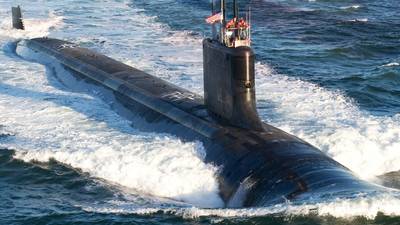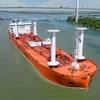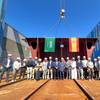Future USS South Dakota Delivered to US Navy
The U.S. Navy accepted delivery of the 17th submarine of the Virginia class, the future USS South Dakota (SSN 790), on September 24.
The next-generation attack submarine began construction in 2013 and is scheduled to be commissioned in early 2019.
South Dakota is the seventh Virginia-class Block III submarine. Block III submarines feature a redesigned bow with enhanced payload capabilities, replacing 12 individual vertical launch tubes with two large-diameter Virginia Payload Tubes, each capable of launching six Tomahawk cruise missiles. This, among other design changes, reduced the submarines' acquisition cost while maintaining their outstanding warfighting capabilities.
"South Dakota's delivery is an important milestone," said Capt. Chris Hanson, Virginia Class Program manager. "It marks the penultimate Block III delivery and will be a vital asset in the hands of the fleet."
The submarine's sponsor is Deanie Dempsey, wife of former Joint Chiefs of Staff chairman and retired Army Gen. Martin Dempsey.
The submarine will be the third U.S. Navy ship to be commissioned with the name South Dakota. The first South Dakota (ACR 9) was a Pennsylvania-class armored cruiser. The ship served in the Pacific until the American entry into World War I, where it patrolled the South Atlantic operating from Brazil, and escorted troop transports destined for Europe.
During World War II, the second South Dakota (BB 57) was commissioned as the lead ship in its class. The four ships of the South Dakota class are considered the most efficient battleships built under the limitations of the Washington Naval treaty. South Dakota served in the Pacific and Atlantic as a carrier escort and patrolled the North Atlantic with the British navy. During the ship's second tour in the Pacific, it helped to cripple the Japanese navy during the Battle of the Philippine Sea before helping to bombard shore defenses at Okinawa and preparing for an eventual invasion of the Japanese home islands.
Virginia-class submarines are built to operate in the world's littoral and deep waters while conducting anti-submarine warfare; anti-surface ship warfare; strike warfare; special operations forces support; intelligence, surveillance and reconnaissance; irregular warfare and mine warfare missions. Their inherent stealth, endurance, mobility and firepower directly enable them to support five of the six maritime strategy core capabilities - sea control, power projection, forward presence, maritime security and deterrence.















